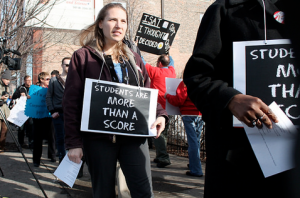Recently, debates and protests have sprung up around the topic of high-stakes testing, the results of which are used to make very important and often life-altering decisions.41 If a student does not succeed, the consequences may result in him being unable to graduate, suffer declines in grades, labeled as a failure, or a diminished reputation in school. If the school does not succeed, it may mean less government funding or even shutting down the school.41 Even though high-stakes testing has been around since the 1980s, after the publication of “A Nation at Risk,” it became more center stage when the Bush Administration passed the “No Child Left Behind” policy in 2001 that mandated that all children in public schools – regardless of academic challenges, socioeconomic status or level of ability to speak and understand English – take annual tests.41
This policy has produced arguments both for and against high-stakes testing. Those supporting these tests believe that it holds the school, teachers and administrators responsible for students’ learning; that it motivates them to perform at a higher standard; and allows teachers to tailor lesson plans to low-performing students.41 However, those opposed believe that it is detrimental to the English-language learners, those with disabilities, and the poor students; that it increases stress and anxiety for the students; can cause students to be isolated by classmates and teachers if they don’t perform well; and focuses teachers to teach to the test, therefore narrowing the curriculum.41
Given the rising opposition against high-stakes testing by students, parents and schools, grassroots organizations have formed seeking to eradicate these tests in schools. The majority of the grassroots organizations are not only against high-stakes testing but also other issues such as charter schools, school privatization, union rights, and school closures. Despite the multitude of issues being addressed by these organizations, they all seek the same end result, which is that children receive the best possible educational opportunities. Some of the groups focused solely on opposing high-stakes testing in public schools include Time Out From Testing, Change The Stakes, Choose To Refuse NJ, More Than A Score, Texans Advocating For Meaningful Student Assessment (TAMSA), and Re-thinking Testing. These groups want testing to stop in the belief that they are not a good representation of students’ abilities; that they put added pressure on both teachers and schools; that the results are misrepresented to the public; that the results of the tests are worth 15% of the students’ grades; that teachers are teaching to the test; and that government funding is determined by the results.2,3,7&8 Collectively, these groups have raised awareness on the issues created by high-stakes testing, have devised strategies that parents can use to opt-out of testing, and have increased their presence in educational policy meetings and formed protests.14&15

35
This protest occurred in Chicago (2014)

35
